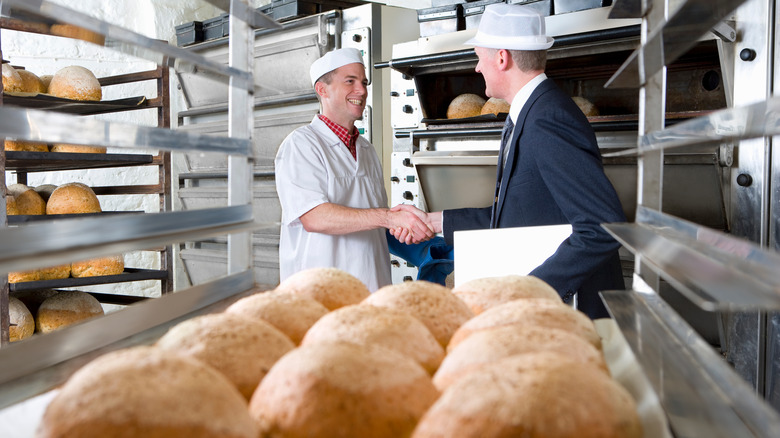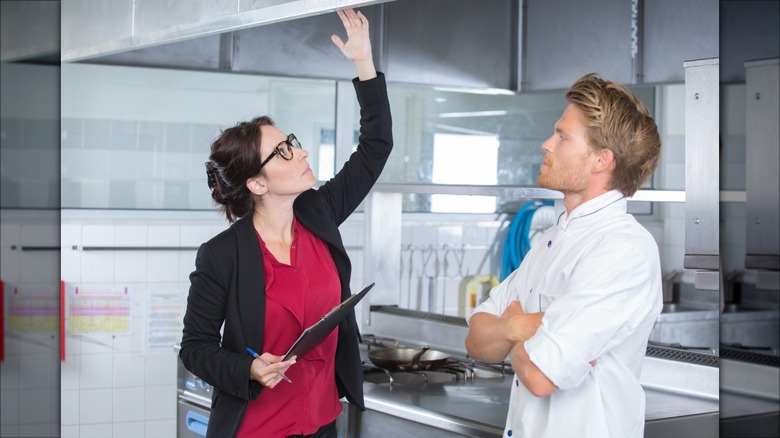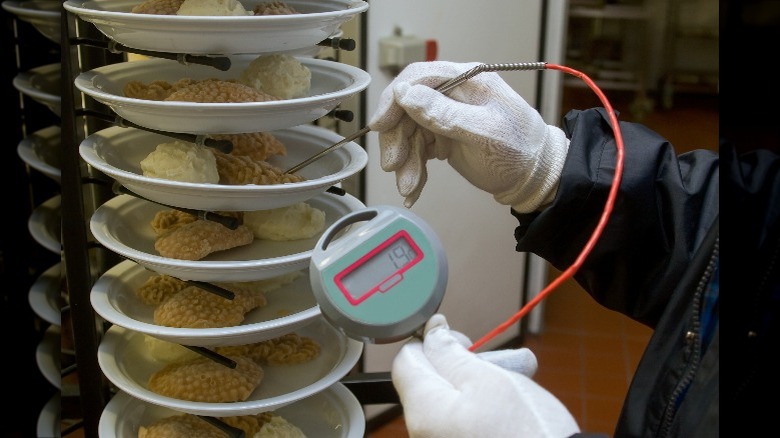Robert Irvine Just Set The Record Straight About 'Dirty' Restaurants
Reality programs like "Kitchen Nightmares" and "Restaurant: Impossible" derive a lot of their entertainment from just how dysfunctional the restaurants appear when the celebrity chef arrives. Mold? Good. Rats? Better. It does, however, raise the question about how these establishments manage to stay open long enough for their rehabilitation to occur. Surely, there must be health inspectors, right?
That's what two fans asked Robert Irvine after watching one episode of "Restaurant: Impossible." "I saw a sticker that gave them an A rating from the same year," Irvine wrote in a Jan. 12 Twitter post. However, he doubted the inspector did a thorough job because "it doesn't get that dirty overnight."
Irvine elaborated on that explanation when addressing a second question on Twitter about how the restaurant was allowed to operate for so long. He reiterated that the sticker was given earlier that year but added that local governments often don't have enough health inspectors to conduct frequent follow-up checks, especially when the restaurant has already passed the initial inspection. "Some don't get them inspected for a couple years," he continued, "ridiculous if you ask me .. should be more priority."
The issues facing health inspectors
The lack of health inspectors available to check restaurants rigorously isn't a new problem. Six years ago, a similar conversation began on Reddit, where the same explanation for why there are so many unhygienic restaurants still open was given: "Too many restaurants and not enough health inspectors ... [Plus if] they do come and you have violations, they tell you what they are and you have 24hrs to fix them. If you fix them then you're clear for another year."
In fact, this particular labor shortage posed problems in March 2019, a year before the pandemic set in. CBS Pittsburgh reported that month that the number of health inspectors had dropped by 20%, leaving some places unchecked since 2016. "I think they've always been understaffed, and the reason they're understaffed is that the job doesn't pay enough," one restauranteur speculated to CBS.
Another issue is that health inspectors run the risk of finding themselves in potentially dangerous situations. After all, their job is to threaten other people's jobs if a level of hygiene is not met. As the Phoenix New Times discovered in 2016, health inspections can quickly become shouting matches or worse, with one report detailing a case where a restaurant owner wielded a meat tenderizer toward a health inspector. While that's obviously an extreme example, it highlights the stressful environments in which some health inspectors have to work.
Budget issues are rampant
Being a health inspector is already a stressful job, and it's one that's only made worse by budget issues.
Take, for example, the dire strait of the situation in Massachusetts. In December 2021, WGBH reported that an allocation of $200 million to local health services could radically transform said services. Obviously, $200 million is a lot of money — but it's the extent of what people did to make do that speaks to why some restaurants just aren't checked.
Health agent Delshaune Flipp explained to WGBH that before the new funds allocation, she was "juggling a wide range of responsibilities, including trash, recycling, restaurant inspections, pool inspections, and housing inspections." That's all for Rockland, Mass., a town of 20,000 people.
Similarly, The Delco Times reported on January 9 that seven townships were suing Pennsylvania's Delaware County to prevent them from taking over health inspections. The issue wasn't the need for a county-wide department of health but that the county reportedly failed to properly staff and budget the positions in time for the township to deal with their own budgeted health inspectors. That situation is less dramatic than the one in Massachusetts, but it shows the complexities involved in having health inspectors in the first place.
Confusion leaves room for shady dealings
With such disarray, it's only to be expected that some kind of fraud or corruption can crop up in the world of food inspection.
In December 2021, the New York Daily News reported that three restaurant owners in Brooklyn were arrested for bribing a health inspector. Specifically, they wanted a week's notice so they could conduct a quick annual cleanse before letting everything fall apart again once the inspection was complete. This defeats the purpose of the inspections, which are meant to ensure establishments follow health codes year round.
A bribery scam may also be afoot in Missouri, as The Mexico Ledger reported on January 12 that a fraudulent health inspector had been making the rounds. "This can look like someone calling to schedule an inspection or arriving on site and stating they are a 'health inspector,'" the Missouri Department of Health and Senior Services said in an email obtained by the outlet. While the profits of the scam weren't detailed in the report, it's easy to imagine a promise for leniency in exchange for a bribe.
Another issue with the health inspection system was detailed by the Dallas Observer in May 2018: namely, that health inspectors operate with a quota. So, if a restaurant requires a followup, that followup will occur after the other inspections, which can result in restaurants closing while they wait. In short, health inspectors are needed, but the current system is a bit of a mess.



